Key takeaways
- SQL is a powerful and intuitive tool for managing and querying databases, enabling users to extract specific data easily.
- Khan Academy’s interactive tutorials effectively build knowledge through hands-on exercises, making complex concepts more approachable.
- Practical projects, such as managing a library database, provide real-world applications of SQL, enhancing understanding and confidence.
- Consistency in study, active practice, and breaking down complex topics are essential strategies for mastering SQL.
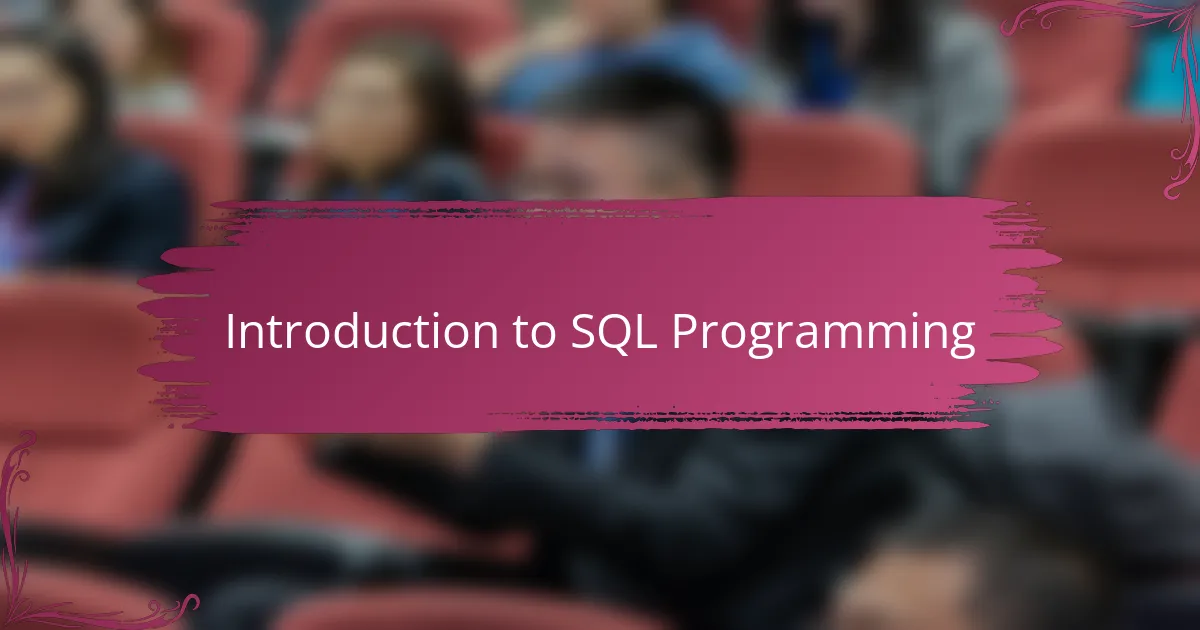
Introduction to SQL Programming
SQL, or Structured Query Language, is the backbone of managing and manipulating databases. When I first encountered SQL, I was fascinated by how a few simple commands could sift through massive amounts of data to find exactly what I needed. Have you ever wondered how websites store and organize all their information? That’s where SQL steps in.
What struck me most about SQL was its universality—no matter the database system, the fundamentals remain consistent. Learning to write queries felt like unlocking a secret code to the digital world, and it motivated me to dive deeper. It wasn’t just about coding; it was about understanding how data lives and breathes behind the scenes.
Though SQL might seem intimidating at first, its logic is surprisingly intuitive. Each time I wrote a query, I felt a small sense of accomplishment, as if I was teaching a machine to understand my questions. Isn’t that the essence of programming—building a conversation between us and technology?
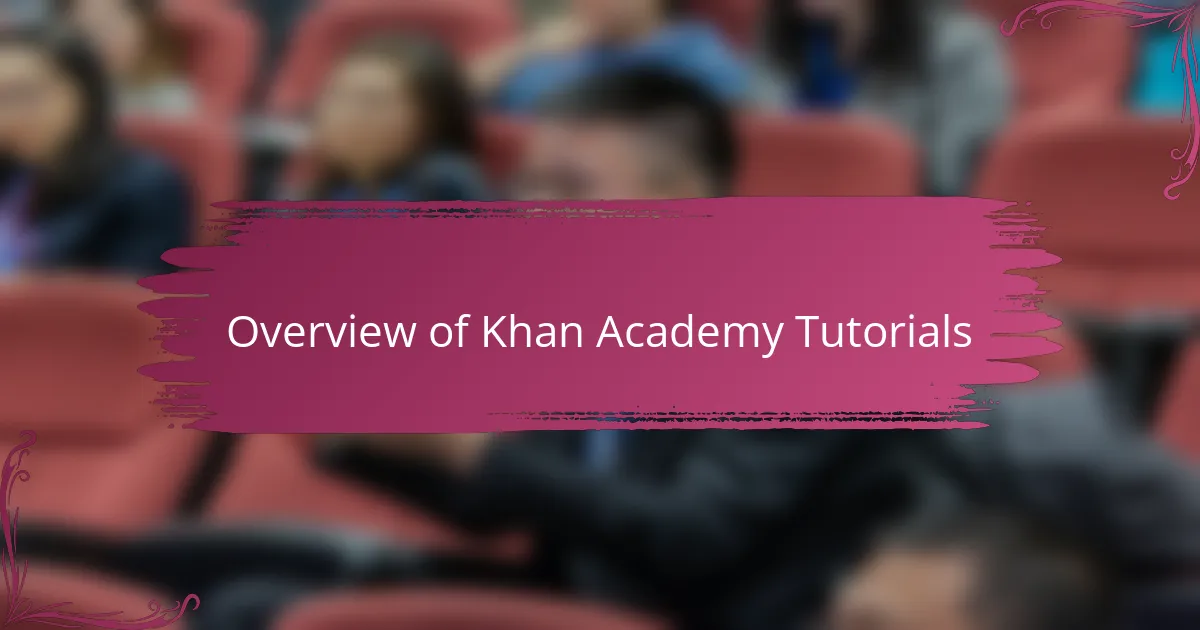
Overview of Khan Academy Tutorials
Khan Academy’s tutorials on SQL immediately caught my attention with their clear, step-by-step approach. What I appreciated most was how each lesson built on the last, making complex concepts feel approachable rather than overwhelming. Have you ever tried learning something that seemed daunting at first, only to find yourself genuinely enjoying the process as things started to click? That’s exactly what happened to me here.
The interactive nature of Khan Academy’s SQL courses made a big difference in my understanding. Instead of passively watching videos, I was writing queries right away, testing my knowledge and seeing immediate results. This hands-on experience transformed abstract ideas into practical skills, which I found far more engaging than traditional tutorials or textbooks.
One thing that stood out was the platform’s emphasis on real-world examples. The exercises involved scenarios like managing a library database or analyzing sales data, which made me realize how SQL can be applied beyond just theory. I often asked myself, “How would I use this in a job or project?” and Khan Academy helped me connect the dots in a very natural way.
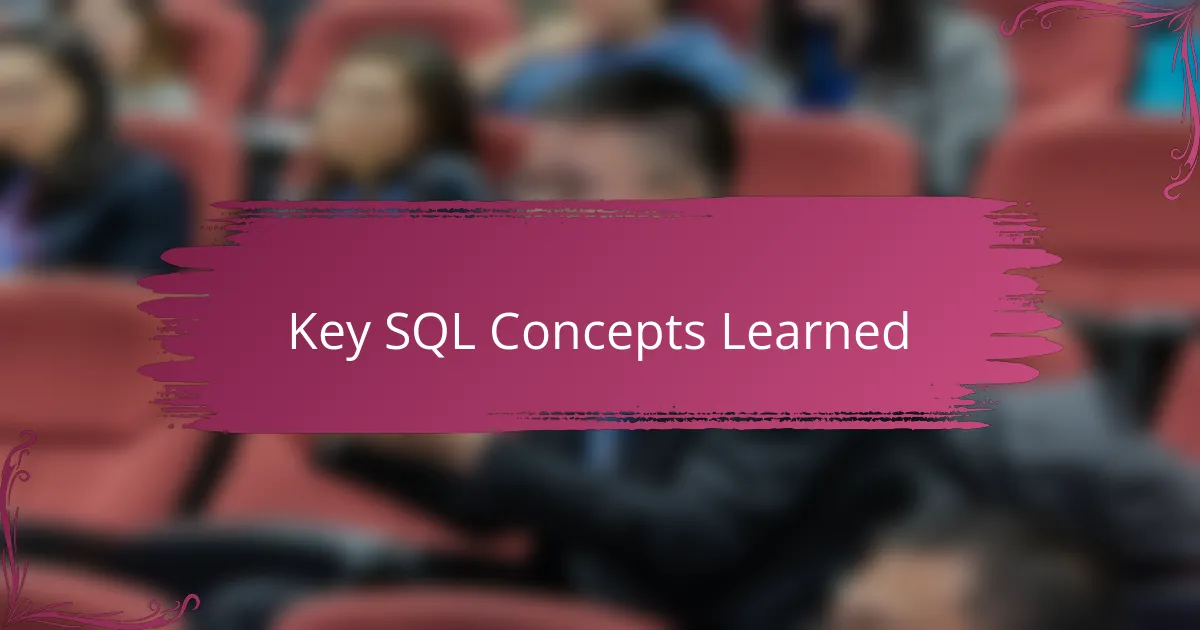
Key SQL Concepts Learned
One of the first concepts that really clicked for me was the SELECT statement. It felt empowering to know that I could pull exactly the data I needed from a vast table with just a few words. Have you ever experienced that moment when something that seemed complex suddenly becomes clear? That’s how querying data transformed from a mystery to a tool I could confidently wield.
I also found learning about filtering data using WHERE clauses to be a game-changer. It’s like giving the computer precise instructions on what to look for—much like telling a friend exactly which books to find in a huge library. This ability to narrow down results made the whole process feel sharper and more purposeful.
Joining tables through concepts like INNER JOIN opened my eyes to the interconnected nature of databases. It was fascinating to see how separate pieces of data could be linked together to tell a bigger story. Have you noticed how understanding relationships between data points can turn raw numbers into meaningful insights? That realization made me appreciate the depth and flexibility SQL offers.
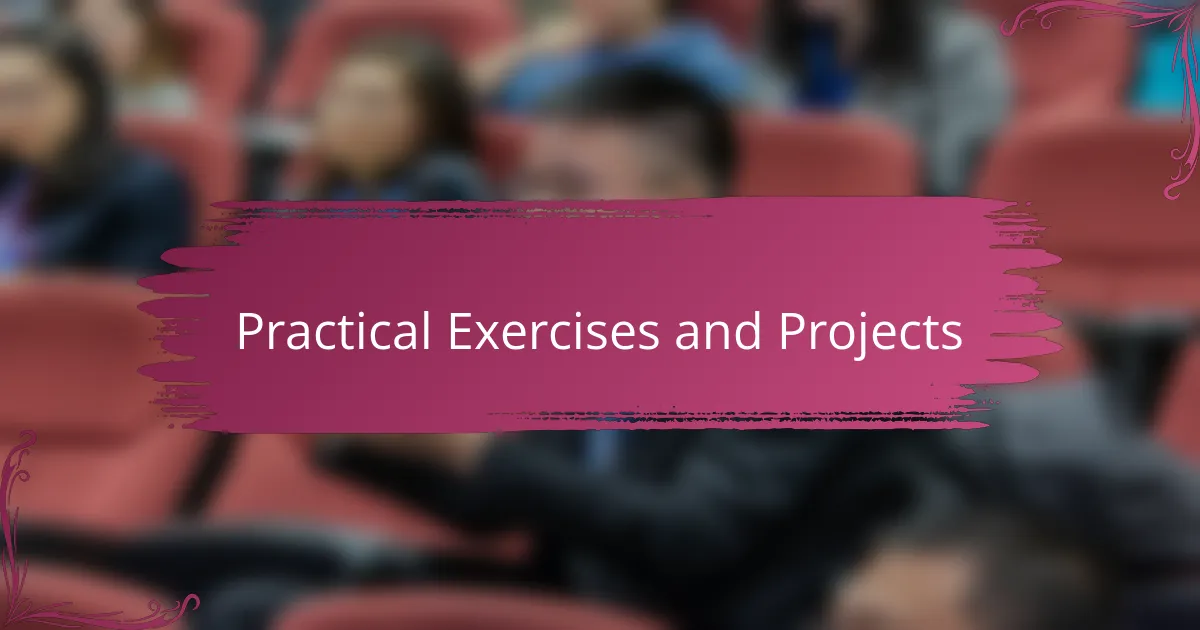
Practical Exercises and Projects
The practical exercises on Khan Academy truly brought the lessons to life for me. Each challenge pushed me to apply what I’d just learned, turning abstract concepts into hands-on experience. Did I feel frustrated at times? Absolutely—but those “aha” moments when my queries finally worked made every stumble worth it.
One project involved creating queries to manage a fictional library’s inventory, which I found surprisingly fun. It wasn’t just about typing commands; it was like solving a puzzle, figuring out how to extract meaningful information from the data. Have you ever felt that thrill when a complex problem suddenly unfolds before your eyes? That’s exactly the feeling I got during these exercises.
What struck me most was how these projects showed the real-world potential of SQL. Rather than just memorizing syntax, I was building solutions—something I rarely experienced with other programming tutorials. This practical, project-based learning made me confident that I could tackle data problems beyond the course itself.
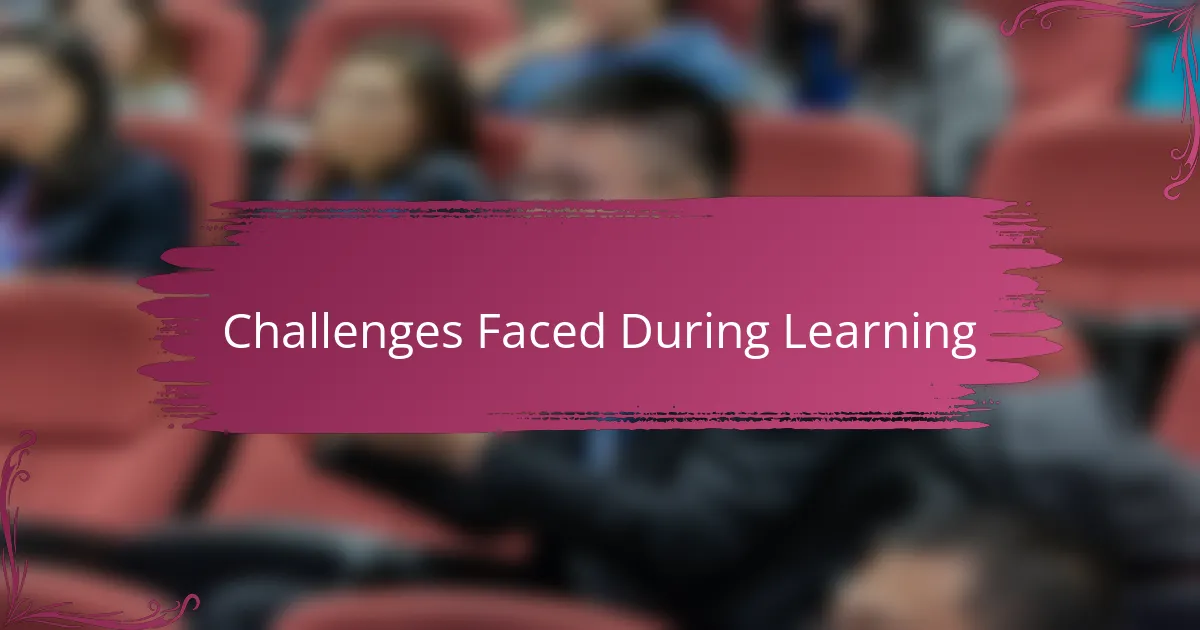
Challenges Faced During Learning
One challenge I faced was wrapping my head around the more complex JOIN operations. At times, it felt like trying to piece together a jigsaw puzzle without knowing the final picture. Have you ever stared at lines of code, wondering why results weren’t quite what you expected? That confusion was very real during those moments.
Another difficulty was remembering the specific syntax for different clauses. Even though Khan Academy’s exercises were clear, I occasionally mixed up keywords or forgot the order they needed to appear in. It reminded me how learning SQL is as much about practice as understanding concepts—those small errors taught me patience and perseverance.
I also struggled initially with the idea of thinking in terms of sets of data, rather than individual records. It was a shift in mindset that didn’t come instantly. Have you ever had to change how you approach a problem to truly get it? That realization helped me appreciate SQL’s power but also humbled me to be more methodical in my approach.

Tips for Effective SQL Study
One thing I found essential for effective SQL study was consistency. Dedicating even just 20 to 30 minutes daily made a huge difference in retaining concepts and building confidence. Have you ever noticed how small, regular efforts often lead to bigger results than occasional marathon sessions? That steady rhythm helped me stay connected to the material without feeling overwhelmed.
Another tip I swear by is to practice actively, not just read or watch. Writing queries alongside lessons—even if it means making mistakes—was where real learning happened for me. It reminded me that understanding SQL isn’t about perfection but experimentation. When I allowed myself to explore and learn from errors, every challenge turned into an opportunity.
Lastly, I found that breaking complex topics into bite-sized pieces really helped. Instead of rushing through all types of JOINs at once, I focused on mastering one concept at a time. Have you ever tried tackling too many ideas at once and ended up more confused? Slowing down and revisiting tricky parts repeatedly made a world of difference in my progress.
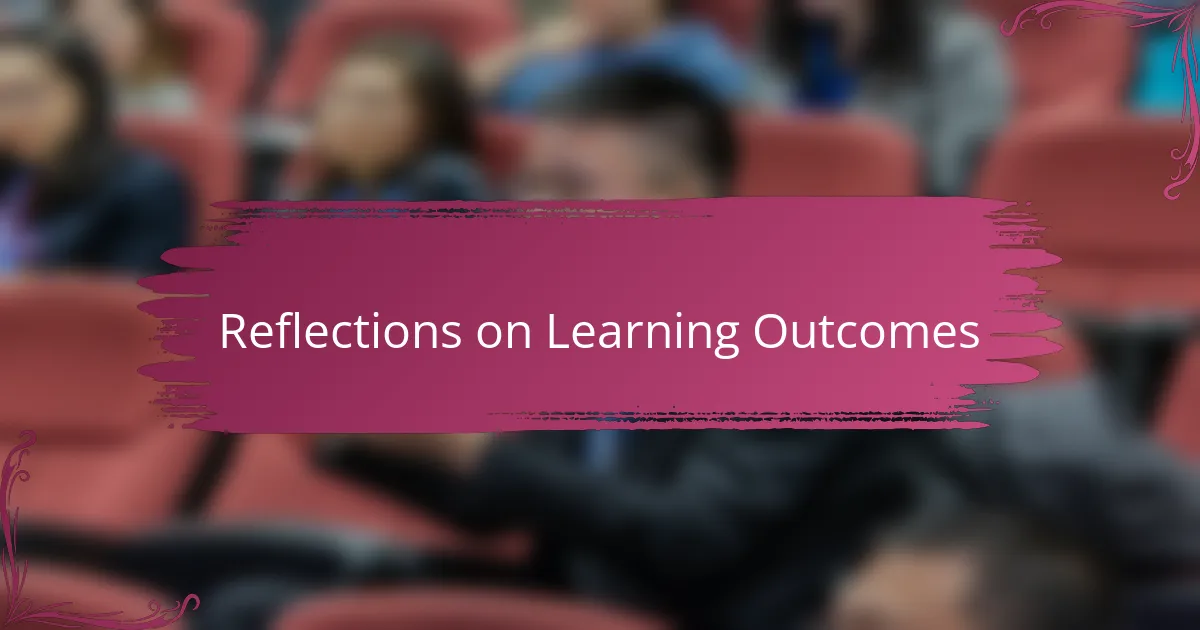
Reflections on Learning Outcomes
Looking back, I realize that the most rewarding outcome was gaining confidence. There were moments when I doubted if I’d ever truly grasp SQL’s logic, but each small win reinforced my belief that I could learn and apply it effectively. Have you ever felt that mix of frustration and excitement when a skill finally clicks? That’s exactly how I felt with SQL.
I also noticed how learning through Khan Academy shaped my problem-solving mindset. Instead of seeing errors as setbacks, I began to treat them as clues guiding me toward better queries. This shift made the learning process less intimidating and more like an ongoing conversation with the code.
Ultimately, the clarity I’ve gained in understanding data relationships feels invaluable. It’s not just about writing queries anymore; it’s about interpreting information in a way that makes sense and supports real decisions. Isn’t that what truly matters when we learn programming—to transform data into insights we can trust?